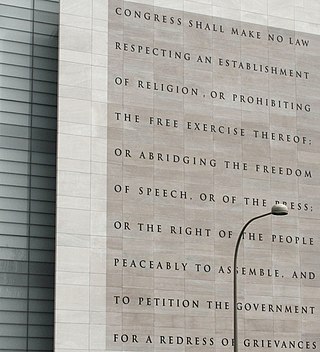Related Research Articles

"Don't ask, don't tell" (DADT) was the official United States policy on military service of non-heterosexual people. Instituted during the Clinton administration, the policy was issued under Department of Defense Directive 1304.26 on December 21, 1993, and was in effect from February 28, 1994, until September 20, 2011. The policy prohibited military personnel from discriminating against or harassing closeted homosexual or bisexual service members or applicants, while barring openly gay, lesbian, or bisexual persons from military service. This relaxation of legal restrictions on service by gays and lesbians in the armed forces was mandated by Public Law 103–160, which was signed November 30, 1993. The policy prohibited people who "demonstrate a propensity or intent to engage in homosexual acts" from serving in the armed forces of the United States, because their presence "would create an unacceptable risk to the high standards of morale, good order and discipline, and unit cohesion that are the essence of military capability".

Title IX is the most commonly used name for the landmark federal civil rights law in the United States that was enacted as part of the Education Amendments of 1972. It prohibits sex-based discrimination in any school or any other education program that receives funding from the federal government. This is Public Law No. 92‑318, 86 Stat. 235, codified at 20 U.S.C. §§ 1681–1688.

Georgetown University is a private Jesuit research university in Georgetown neighborhood of Washington, D.C., United States. Founded by Bishop John Carroll in 1789 as Georgetown College, it is the oldest Catholic institution of higher education in the United States and the nation's first federally chartered university.
Boston College Law School is the law school of Boston College, a private Jesuit research university in Chestnut Hill, Massachusetts. It is situated on a 40-acre (160,000 m2) campus in Newton, Massachusetts, about 1.5 miles (2.4 km) from the university's main campus in Chestnut Hill.

Vermont Law and Graduate School (VLGS) is a private law and public policy graduate school in South Royalton, Vermont. It offers several degrees, including Juris Doctor (JD), Master of Laws (LLM) in Environmental Law, Master of Environmental Law and Policy (MELP), Master of Food and Agriculture Law and Policy (MFALP), Master of Energy Regulation and Law (MERL), and dual degrees with a diverse range of institutions. According to the school's 2018 ABA-required disclosures, 61.5% of the Class of 2018 obtained full-time, long-term, JD-required employment nine months after graduation.
The Employment Non-Discrimination Act (ENDA) is legislation proposed in the United States Congress that would prohibit discrimination in hiring and employment on the basis of sexual orientation or, depending on the version of the bill, gender identity, by employers with at least 15 employees.

The Georgetown University Law Center is the law school of Georgetown University, a private research university in Washington, D.C., United States. It was established in 1870 and is the largest law school in the United States by enrollment, with over 2000 students. It frequently receives the most full-time applications of any other law school in the United States.

In the United States, freedom of speech and expression is strongly protected from government restrictions by the First Amendment to the U.S. Constitution, many state constitutions, and state and federal laws. Freedom of speech, also called free speech, means the free and public expression of opinions without censorship, interference and restraint by the government. The term "freedom of speech" embedded in the First Amendment encompasses the decision what to say as well as what not to say. The Supreme Court of the United States has recognized several categories of speech that are given lesser or no protection by the First Amendment and has recognized that governments may enact reasonable time, place, or manner restrictions on speech. The First Amendment's constitutional right of free speech, which is applicable to state and local governments under the incorporation doctrine, prevents only government restrictions on speech, not restrictions imposed by private individuals or businesses unless they are acting on behalf of the government. However, It can be restricted by time, place and manner in limited circumstances. Some laws may restrict the ability of private businesses and individuals from restricting the speech of others, such as employment laws that restrict employers' ability to prevent employees from disclosing their salary to coworkers or attempting to organize a labor union.

Gerald Brooks Hunt Solomon was an American businessman and politician most notable for his long service as a member of the United States House of Representatives in New York.

The term Solomon Amendment has been applied to several provisions of U.S. law originally sponsored by U.S. Representative Gerald B. H. Solomon (R-NY).

The University of Memphis Cecil C. Humphreys School of Law is an American Bar Association accredited law school and is the only law school in Memphis, Tennessee. The school has been associated with the University of Memphis since the law school's formation in 1962. The school was named in honor of former University president Cecil C. Humphreys. It is also referred to as U of M Law, Memphis Law, or Memphis Law School.

Georgetown University in Qatar (GU-Q) is a campus of Georgetown University in Education City, outside of Doha, Qatar. It is one of Georgetown University's eleven undergraduate and graduate schools, and is supported by a partnership between Qatar Foundation and Georgetown University.
Rumsfeld v. Forum for Academic and Institutional Rights, Inc., 547 U.S. 47 (2006), was a United States Supreme Court case in which the Court ruled that the federal government, under the Solomon Amendment, could constitutionally withhold funding from universities if they refuse to give military recruiters access to school resources. Law schools were unwilling to allow recruiters onto campus because they considered the military's so-called "Don't ask, don't tell" policy discriminatory. The Supreme Court held oral arguments on December 6, 2005, and issued an 8–0 decision on March 6, 2006, finding the Solomon Amendment constitutional.
Jane Richards Roth is an American attorney and jurist serving as a Senior United States circuit judge of the United States Court of Appeals for the Third Circuit. She was previously a United States district judge of the United States District Court for the District of Delaware.

Oklahoma City University School of Law, also known as OCU Law, is the law school of Oklahoma City University. OCU Law is located in Oklahoma City, Oklahoma, and was founded in 1907. OCU Law was located in the Sarkeys Law Center on the southwest side of the Oklahoma City University campus until spring 2015, when it moved to a new campus near downtown Oklahoma City.

The Genetic Information Nondiscrimination Act of 2008, is an Act of Congress in the United States designed to prohibit some types of genetic discrimination. The act bars the use of genetic information in health insurance and employment: it prohibits group health plans and health insurers from denying coverage to a healthy individual or charging that person higher premiums based solely on a genetic predisposition to developing a disease in the future, and it bars employers from using individuals' genetic information when making hiring, firing, job placement, or promotion decisions. Senator Ted Kennedy called it the "first major new civil rights bill of the new century." The Act contains amendments to the Employee Retirement Income Security Act of 1974 and the Internal Revenue Code of 1986.
Joseph Charles Steffan is an American lawyer and gay activist. He was expelled from the U.S. Naval Academy in Annapolis in 1987 shortly before graduation after disclosing his homosexuality. He sued the U.S. Department of Defense, claiming that his oral avowal of homosexuality could not be construed as an indication that he ever had or intended to engage in sexual relations with another man. He lost a protracted court battle for reinstatement in 1994.
The Military Readiness Enhancement Act was a bill introduced in the U.S. House of Representatives in several sessions between 2005 and 2009. It would have amended title 10, United States Code to include a policy of nondiscrimination on the basis of sexual orientation, replacing the policy known as "Don't ask, don't tell" (DADT), which banned disclosing one's homosexuality while serving in the Armed Forces.

The Don't Ask, Don't Tell Repeal Act of 2010 is a landmark United States federal statute enacted in December 2010 that established a process for ending the "don't ask, don't tell" (DADT) policy, thus allowing gay, lesbian, and bisexual people to serve openly in the United States Armed Forces. It ended the policy in place since 1993 that allowed them to serve only if they kept their sexual orientation secret and the military did not learn of their sexual orientation, which was controversial.

John Berchmans Creeden was an American Catholic priest and Jesuit, who served in many senior positions at Jesuit universities in the United States. Born in Massachusetts, he attended Boston College, and studied for the priesthood in Maryland and Austria. He taught at Fordham University and then at Georgetown University, where he became the dean of Georgetown College in 1909, and simultaneously served as the principal of Georgetown Preparatory School.
References
- ↑ "Member Schools". Association of American Law Schools. Retrieved 2024-03-22.
- ↑ "History". Association of American Law Schools. Retrieved 2024-03-22.
- ↑ "About". Association of American Law Schools. Archived from the original on 2022-06-26. Retrieved 2022-06-22.
- ↑ "American Law Schools". The Fort Wayne Journal-Gazette. Fort Wayne, Indiana. 24 August 1905. p. 5. Archived from the original on 8 January 2024. Retrieved 26 November 2020.
- ↑ "Incoming AALS President Melanie Wilson Aims to Instill 'Courage in Action'". Law.com. Retrieved 2024-02-13.
- ↑ "AALS Announces 2024 Leadership". Association of American Law Schools. Retrieved 2024-02-13.
- ↑ "Judith Areen '69 Named Seventh Executive Director of AALS". law.yale.edu. 12 February 2014. Archived from the original on 2023-03-15. Retrieved 2022-06-22.
- ↑ Lewin, Tamar (1998-04-22). "Georgetown President Ends Push to Replace Law School Dean". The New York Times. ISSN 0362-4331. Archived from the original on 2022-06-22. Retrieved 2022-06-22.
- ↑ "Georgetown University names William Treanor law school dean - academicjobs.net". www.academicjobs.net. Archived from the original on 2021-10-31. Retrieved 2022-06-22.
- ↑ "Professional Development". Association of American Law Schools. Retrieved 2024-03-22.
- ↑ Memorandum, AALS Activities Report, May 15, 2015. http://www.americanbar.org/content/dam/aba/administrative/legal_education_and_admissions_to_the_bar/council_reports_and_resolutions/June2015CouncilOpenSessionMaterials/2015_may_aals_report.authcheckdam.pdf Archived 2016-03-04 at the Wayback Machine
- ↑ On-Campus Military Recruiting – Balancing AALS Rules, Other Nondiscrimination Policies and the Solomon II Amendment, December 15, 1998, "Dec. 15, 1998 Supplemental Report on Amelioration". Archived from the original on 2004-02-10. Retrieved 2011-01-26.
- ↑ AALS Section on Gay and Lesbian Legal Issues, September 15, 1998, "AALS Section Sept 15 1998 Report and Recommendation". Archived from the original on 2003-10-17. Retrieved 2011-01-26.
- ↑ DADT Repeal and On-Campus Military Recruiters, PrawfsBlawg, December 24, 2010, http://prawfsblawg.blogs.com/prawfsblawg/2010/12/dadt-repeal-and-on-campus-military-recruiters.html Archived 2011-02-04 at the Wayback Machine